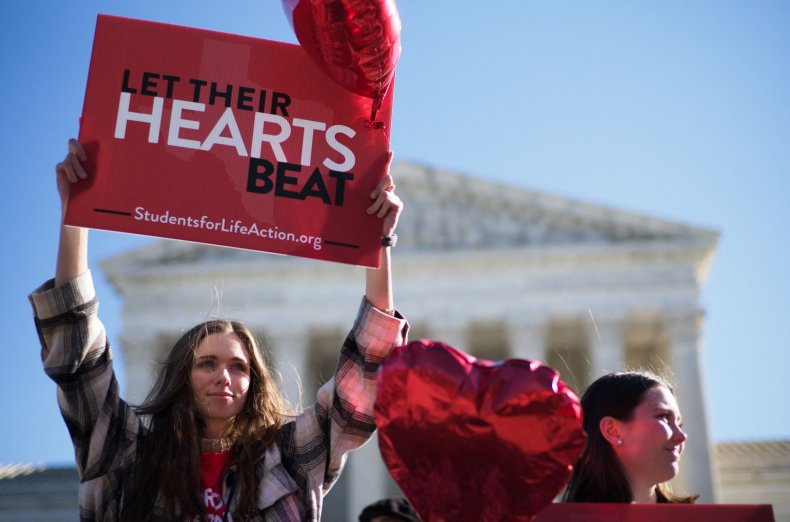In Dobbs, Abortion Advocates Don't Contest the Humanity of the Preborn | Opinion
On December 1, the U.S. Supreme Court will hear arguments in Dobbs v. Jackson Women's Health Organization. The case is a direct challenge to Roe v. Wade's viability standard, which prohibits states from enacting laws that restrict abortion access before a fetus is viable and can survive outside of the womb (that is, during the first 24 weeks of pregnancy). Fifty briefs were submitted urging the Court to uphold Roe and overturn Mississippi's 15-week abortion ban—the law being reviewed by the Court in Dobbs.
However, not a single one of those 50 briefs contested the biological classification of human zygotes, embryos and fetuses as human beings and members of the species Homo sapiens, nor did any provide an alternative biological view on when a human's life begins.
This failure to address the question of whether the preborn are human beings was surprising, since the brief by Mississippi—and the briefs by the dozens of entities that supported the state's call to overturn Roe—argued that there is no constitutional right to abortion because scientific advances have shown that abortion procedures entail the taking of a human's life.
In support of such claims, the briefs cited medical textbooks and peer-reviewed scientific articles affirming the view that a human's life begins at fertilization ("the fertilization view"). Journals such as Science, Nature, Cell and Reproduction present the view without citation or explanation, which suggests that the editors, reviewers, and authors who contribute to scientific journals recognize the fertilization view as common knowledge and as the uncontroversial, leading biological view on when a human's life begins.
The fertilization view was not only advanced by those who sought to undermine Roe. Biologists from 15 countries joined to sign a brief solely dedicated to explaining the biological perspective on when a human's life begins. The list of signatories included a Nobel prize-winning researcher who was also a signatory to the Humanist Manifesto, which calls for absolute, taxpayer-funded abortion access.
These biologists were not trying to put their collective thumb on the scale. They explicitly stated that they were not arguing that the Court must render any particular decision in the Dobbs case—they simply sought to "provide the members of the U.S. Supreme Court with an analysis of the fertilization view in hopes that they will correct the Roe Court's outmoded factual record on the fertilization view and the question of whether there is a consensus on when a human's life begins."

What was this "outmoded factual record?" In 1973, the Roe Court characterized the fertilization view as "one theory of life," and said it was "not in a position to speculate" on the "difficult question of when life begins" at that "point in the development of man's knowledge." It was on this basis that the Court created the viability standard and used it to rule against a state law that banned abortion at fertilization.
The biologists' brief responded directly to this reasoning by providing scientific sources that advance the fertilization view. The brief concluded that "no current member of the Court would have to speculate" on the crucial question the Roe Court avoided, because "[t]he fertilization view is widely recognized—in the literature and by biologists—as the leading biological view on when a human's life begins."
So, why didn't pro-Roe briefs try to counter this assertion?
Consider a recent Salon piece on the biologists' brief. The author argued that "biology does not determine when human life begins" because "it is a question that can only answered by appealing to...what we take to be human." However, this claim is contradicted by the very next sentence, which suggested that biology could soon be determinative if "biologists of the future" learn more. What they would still need to learn is unclear, since the fertilization view has been the leading scientific view since embryology was first pioneered in the early 1800s.
While opinion writers might be willing to inject doubt from the sidelines, it seems no abortion advocate or attorney was willing to risk their credibility by filing a brief that denies the overwhelming scientific consensus on when a human's life begins. As the biologists' brief noted, 96 percent of the 5,577 international biologists surveyed on the question have affirmed the fertilization view—and 85 percent of those biologists identified as pro-choice.
Since the legal process is adversarial in nature and pro-Roe briefs failed to contest the fertilization view, the Court can take abortion advocates' silence as evidence that there is no dispute on the humanity of the preborn and confidently replace the viability standard with a fertilization standard. This would effectively return abortion to the states and empower legislators to pass abortion laws that fulfill their 14th Amendment duty to provide all humans, born and preborn, equal protection under the law.
Steve Jacobs is the program director of Illinois Right to Life. He received his J.D. from the Northwestern University School of Law and his Ph.D. from the University of Chicago.
The views expressed in this article are the writer's own.


